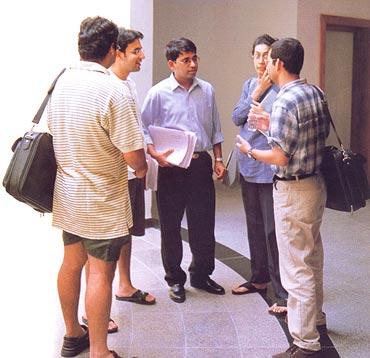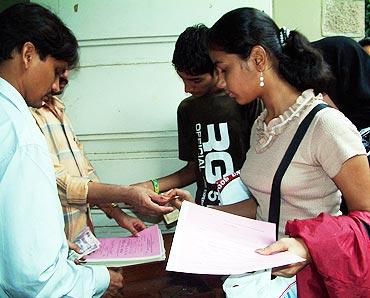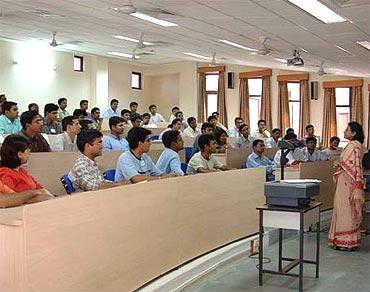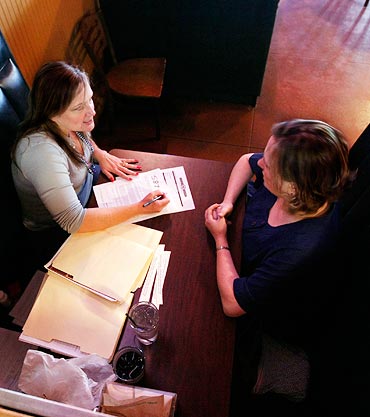
The author of bestsellers like Stay Hungry Stay Foolish and Connect the Dots explains why MBAs should be looked upon as long-term investments.
In the last couple of months I've met with students at ISB, Great Lakes, ICFAI Business School, Hyderabad and IIM Indore. And the one concern that unites students across one-year and two-year programmes is the burden of the equated monthly installment, EMI.
The average ISB student will pay an EMI of Rs 25,000 over seven years.
An IIM student will pay Rs 25,000 over five years (going for the exchange programme could jack that up by another Rs 4,000 to Rs 5,000 per month).
So the concern students have is: "What will be my return on investment, ROI?"
The way in which a B-schooler calculates ROI is very direct: Compare what I spent on the course, with the placement salary at the time of exit.
In case you have significant work experience, also factor in one year of 'lost income'.
Ok. By this method of calculation, the ROI -- for a majority of students -- will be negative.
Rashmi Bansal, the author of the bestsellers Stay Hungry Stay Foolish and Connect the Dots, writes on youth, careers and entrepreneurship. You can reach her at mail@rashmibansal.in

The published figure for average domestic salary at ISB last year is Rs 16.47 lakhs (Rs 1.64 million) per annum (cost-to-company).
The fees for this batch were approximately Rs 19 lakhs (Rs 1.9 million), while the average incoming salary was Rs 8 lakhs (Rs 800,000) per annum.
Do the math and you can see that there is much heartburn.
Especially for the 50 per cent of the batch, which must necessarily bag a job lower than the 'average'.
The same holds true for ICFAI business school graduates, where fees plus living expenses for the course would works out to Rs 9 lakhs to Rs 10 lakhs (Rs 900,000 to Rs 1 million).
The average placement salary would be in the range of Rs 5 lakhs to Rs 6 lakhs (Rs 500,000 to Rs 600,000).
A large percentage of candidates are freshers or with one to two years of work experience so we can discount the 'lost income' component.
Now let us examine the case at IIM-Indore.
The average salary for the class of 2010 was Rs 10.29 lakhs (Rs 1.29 million).
The cost of the two-year course for this batch was approximately Rs 8 lakhs (Rs 800,000).
Of course, 50 per cent of the batch would have bagged jobs in the Rs 6 lakhs to Rs 10 lakhs (Rs 600,000 to Rs 1 million) range, but prima facie IIM-Indore seems to provide maximum chances of a high ROI.

However, as they say with mutual fund investments, past performance may not be indicative of future returns.
So students who are considering the MBA today -- be warned.
The class of 2010 at IIM-Indore consisted of 175 students. That number went up to 235 for the batch of 2011.
The class of 2012 is a record 450 students.
No doubt this will affect the average salary figure.
In fact the larger the batch, the more the focus the institute puts on 'quantity' over quality.
Moreover from this year, the cost of attending IIM-Indore has also gone up to Rs 10 lakhs (Rs 1 miilion), thus making the 'equation' far less favourable.
I can bore you with several more examples, but you get the drift, right?
The origin of this entire mess goes back to 2008, when the market was booming.
It appeared that the MBA was a Golden Degree, which, like the yellow metal, could only go up, up and up.
Record placement salaries, record number of jobs -- and a relatively low fee structure -- made the MBA a most exciting qualification.
The better the B-school brand, the more excitement, of course.
At this stage, two things happened:
1. In April 2008, IIM-A (Ahmedabad) more than doubled its fees (from Rs 4.30 lakhs/Rs 430,000 to Rs 11.50 lakh/Rs 1.15 million). Other IIMs followed.
2. At the same time, year on year, the IIMs began admitting more students (seats increased between 40 per cent and 100 per cent).
Let me be honest with you: When IIM-A first hiked its fee I thought it was a good thing.
The course was highly subsidised; there seemed to be no reason for taxpayers to underwrite the careers of bright students bagging excellent jobs.
What's more, the IIMs promised that no one would be denied a seat due to lack of funds.
Education loans were made available to all and so were merit scholarships, based on family income.
But the consequences of these actions were not limited to IIM students alone.
In the world of finance the Reserve Bank of India signals changes in rates.
Similarly, the IIMs hiking their fees sent a clear signal to the entire B-school industry.
Practically every B-school in India increased its fees by 50 per cent to 100 per cent.
In a strange and convoluted way, the low fees charged by the IIMs kept the fees of all B-schools low.
No one -- apart from ISB, with its own unique brand -- dared to charge more than the market leader.
To compound the problem, the market crashed.
Jobs disappeared.
The class of 2009 saw the worst of it -- higher fees and lower placement salaries.
The number of students appearing for CAT in 2009 also declined -- for the first time in years.
So, what does this all boil down to?
MBA karna chahiye, ya nahin? (Should one go for an MBA or not?)

Well, I think the 'Gold Rush' era is over.
If you are looking for quick and safe returns, you will be disappointed.
I do think an MBA will add a lot of value to your career over the long term.
By long-term I mean a 10 to 15 year horizon. But you will begin to see the difference in as little as 3 to 5 years.
Certain avenues in the corporate world do open up for you if you have the right 'branding'.
And if you are not from the best-known schools you still have the chance to work your way up the ladder through performance and personality.
40 years of working life lie ahead of most of us. A one or two-year programme is an investment whose returns cannot and should not be calculated merely at the end of the course.
And yes, demand and supply is the inexorable law of Nature.
B-schools may well have to go back to smaller batches and lower fees to make themselves more attractive.
The other -- and the tougher way -- is to provide such value addition that recruiters are happy to shell out more to snap up students.
Yeah right. Better hire Leonardo DiCaprio to do his inception-thingy!
CEOs travelling first class, beware :).